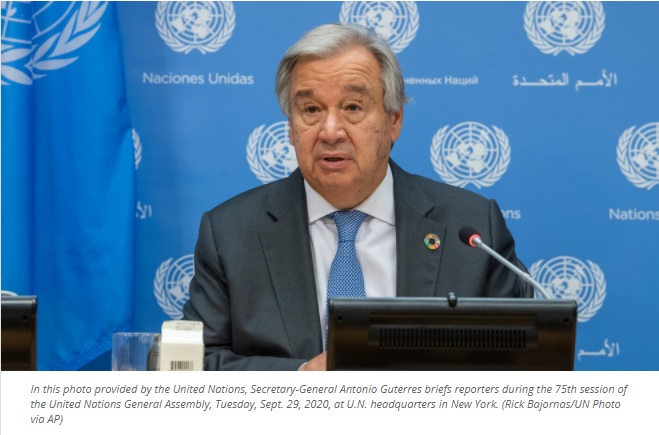by DAVID RISING and EDITH M. LEDERER Associated Press
The U.N. chief on Monday urged world powers and others with interests in Libya’s long-running civil war to keep working toward a lasting cease-fire between its rival governments, warning that the country’s very future “is at stake.”
Secretary-General Antonio Guterres implored those at a virtual ministerial meeting co-hosted by the U.N. and Germany to support peace efforts “not only in words but in actions,” including immediately backing a widely violated U.N. arms embargo against Libya.
“The violations of the embargo are a scandal and call into question the basic commitment to peace of all involved,” he told the closed meeting. “Foreign deliveries of weapons and other military support must stop immediately.”
Libya plunged into chaos after a NATO-backed uprising in 2011 toppled longtime dictator Moammar Gadhafi, who was later killed. The country has since split between rival east- and west-based administrations, each backed by armed groups and foreign governments.
Military commander Khalifa Hifter and his self-styled army launched an offensive in April 2019, trying to capture Tripoli, the capital. But his campaign collapsed in June when the Tripoli-allied militias, with Turkish support, gained the upper hand.
Hifter is supported by Egypt, the United Arab Emirates and Russia. Turkey, a bitter rival of Egypt and the U.A.E. in a broader regional struggle, is the main patron of the Tripoli forces, which are also backed by the wealthy Gulf state of Qatar.
Germany, which has been trying to act as an intermediary, said the virtual meeting was a chance to review what’s been achieved since Berlin hosted a summit on Libya in January at which participants from both sides agreed to respect an arms embargo and push Libya’s warring parties to reach a full cease-fire. That agreement has been repeatedly violated.
“A few weeks ago I wouldn’t have been able to say this: there are reasons for cautious optimism,” German Foreign Minister Heiko Maas said after Monday’s meeting. “We are seeing increasing signs for a shift in thinking from military to political logic.”
“We have always said that stabilizing Libya is no sprint, but a marathon,” said Maas. “But after a phase where things even seemed to be moving backwards in recent months it’s good to be able to say we’ve managed another kilometer today.”
Arab League Secretary General Ahmed Aboul-Gheit said the situation in Libya is still “fragile and complex.”
The virtual meeting came amid international pressure on both sides to avert an attack on the strategic city of Sirte, after a year-long assault on Tripoli by Hifter’s forces collapsed this summer.
Guterres said he has been “encouraged” in recent weeks and months “to witness a lull in the fighting,” with a stalemate around Sirte and direct confrontation between both sides “limited.”
Recent talks in Egypt and Morocco resulted in positive steps by the warring sides, that included a preliminary deal that aims to guide the country toward elections within 18 months and demilitarize the contested city of Sirte. They also agreed to exchange prisoners and open up air and land transit across the country’s divided territory.
Hifter also allowed the reopening of vital oil facilities last month, allowing production for the first time since powerful tribes loyal to him closed oil fields and terminals in January.
Maas met in August in Tripoli with officials in the U.N.-recognized administration, and then traveled to the U.A.E. for talks with leaders there to push them to use the country’s influence with Hifter.
Germany’s deputy U.N. ambassador, Günter Sautter, said Berlin had hoped participants in the meeting would stop the blatant violations of the Libyan arms embargo.







